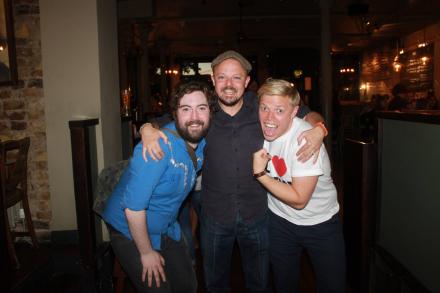
I’m often asked if I have ever done stand-up comedy. I haven’t and I usually say that I can’t think of anything I’d want to do less. Well I can. I’d rather do stand-up than run a comedy club.
As Tiernan Douieb wrote earlier this week, a number of clubs in London are struggling to get bums on seats. The theory goes that it’s down to a combination of post-recession tight-fistedness and a desire to leave the house only to see people you’ve had in your living room on the telly.
So how do you buck that trend? James Gill seems to have come up with an answer. He runs and comperes Always Be Comedy which has three venues in Kennington, Putney and Brixton. I went to the Kennington branch at the Tommyfield last night. It was rammed and there was nobody off-the-telly on the bill. Headliner Nathan Caton had been on Radio 4 at 6.30pm that evening, but I don't think they made sales spike. So how does James do it?
“I set up a night to become a better MC, but then soon got addicted to the running of a night,” explains Gill (pictured between Nick Helm and Rob Beckett), who is, how can we put it, something of a livewire onstage. “I've found that the key is to create an almost a cult-like mentality - I want the Always Be Comedy regulars to feel part of a club and, in my head at least, they are.”
I saw Gill welcoming returning customers as if they were mates: “I’ve got to know some of our regulars personally and actually consider many of them friends. That might sound odd, but it has helped foster a mentality of togetherness. As a result, we attract more and more regulars, so that when some regulars can't make it, there's still enough of a core who keep coming back to keep the room full (touch wood, etc).”
“Booking is also obviously crucial. I try to vary line-ups as much as possible. I want to create an atmosphere where pretty much any type of act can thrive: whether it's someone supposedly more alternative, such as Joseph Morpurgo or John Kearns, someone who really makes you think, such as Sara Pascoe and Katherine Ryan, someone broad, such as Rob Beckett or Seann Walsh, and so on. As a result, acts actively want to play there.”
Gill also makes the nights a bit different with glorified party games between the comedians. He created a live computer game last night which involved quite a bit of effort to prepare (I won't give it away in case he does it again, which he should).
It’s not just the quality of the acts that get the people through the door then, though that is probably pretty crucial or people won't return: “I suppose in a nutshell I want the night to feel as lovely and friendly as possible. If I can drop a name, Russell Howard (clang!) says he likes it because the energy will be as high as can be for when he walks on - that way he can either meet it with energy, or choose to go below it.”
Gill’s approach is clearly working for him. The trouble is it is not a blueprint that can be copied everywhere. He tried to replicate the formula in West Dulwich last year – an area with a young, affluent population who one would have thought would support a new comedy club. But Gill thinks the room was wrong. The ceiling was too high. So you can get almost everything right and still not crack it.
Always Be Comedy gets a lot of its clientele coming back because they are on the mailing list. But even that doesn’t seem to be the only answer. It is not as easy as ABC. James Woroniecki has made a success out of the 99 Club, with a number of branches around Leicester Square and Covent Garden. Like Gill, Woroniecki books great acts but that is not everything. He can’t really rely on locals, he must get his audience from passing trade, ads and flyering.
Woroniecki suggested that the following might be the answer: "The secret to a successful comedy club is not in fact a secret, it's very obvious and it's the comedy itself! Book terrific acts, create a great environment for them to perform in and deliver a wonderful exciting night. If you do that then the audience will come back again and again and recommend it to their friends. Much the same is true of the acts - we have amazing acts performing with us all the time (this week we had Stephen Merchant and Johnny Vegas) and that's down to the reputation we have for providing them a terrific atmosphere in which to practice their art."
He goes on to add that the 99 Club certainly has an eye for a future star: "We have nurtured many amazing talents over the years, with weekly residencies early in their careers for the likes of Paul Foot, Josh Widdicombe, Shappi Khorsandi, Lee Nelson, Rosin Conaty, Carl Donnelly and early gigs for the likes of Jack Whitehall and they all return to us over and over again now that they're established names."
Woroniecki's formula seems to be working. Maybe the secret of running a successful comedy club is also down to a combination of damn hard work and being called James. Nobody sets out to set up a bad club, any more than they set out to make a bad film, but there are plenty of both around. Screenwriter William Goldman famously said about the film industry “nobody knows anything”. Maybe the same applies to the comedy circuit.
Find out more about Always Be Comedy here. Find out more about the 99 Club here.



